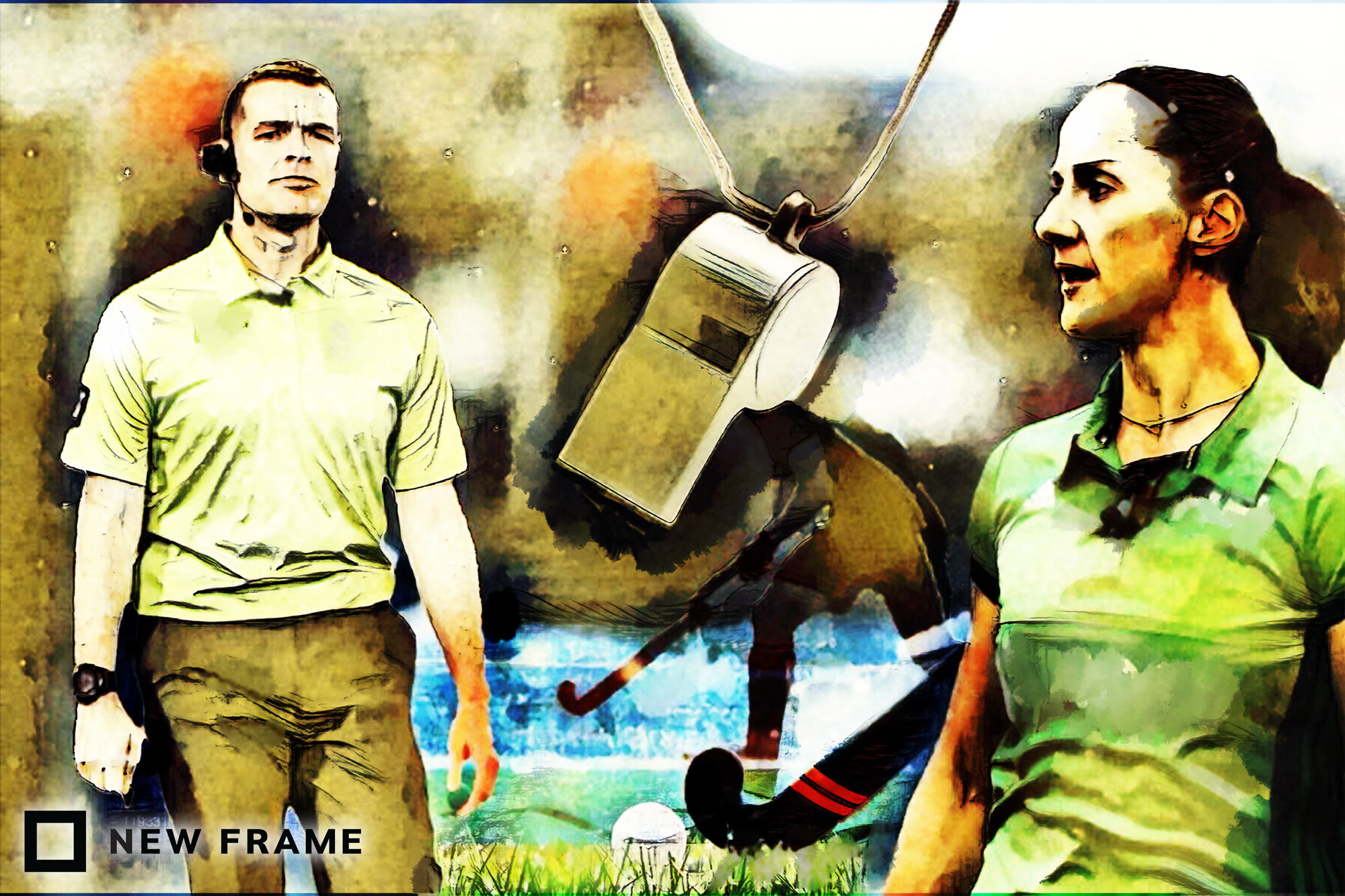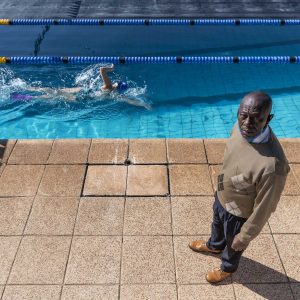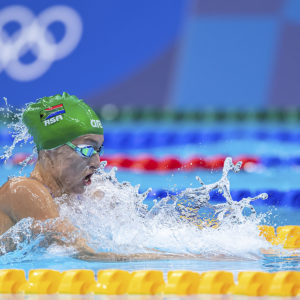SA umpires sign off on top
Peter Wright and Michelle Joubert, two of South Africa’s five hockey officials at the Olympics, continued the country’s fine tradition at the Games. Getting there took planning, fitness training an…
Author:
11 December 2021

Olympic dreams are harboured not only by athletes but also by the often unnoticed officials on the sidelines. So when umpire Peter Wright stepped on to an Olympic hockey pitch for the first time in Tokyo, he too was fulfilling his ultimate aspiration in the sport.
Wright was one of five South African officials at the Oi Hockey Stadium in Tokyo, alongside fellow umpires Michelle Joubert and Annelize Rostron, medical officer Leigh Gordon (one of three) and umpire manager Marelize de Klerk.
“The fitness regime is quite tough,” says Wright about what it takes to be one of the world’s top hockey umpires, “because they expect quite high standards from us and we had to submit quarterly to make sure that we maintain that standard.”
Competitors are regularly hailed for their athletic prowess and performance. But few consider the aspirations, training and mental preparation that go into being a match official, particularly in hockey, where fitness is vital.
“We have to do a sprint test of six 40m sprints and we have to get under a certain time. So, for the men, it’s 6.2s, which is quite tough. Then we have to do the yo-yo fitness test as well, where we have to get to level 19.6, I think, so it’s quite difficult. And the older we get, it becomes a bit more difficult to try and get that going.”
Joubert, who works as head of sport at Brescia House School in Johannesburg, adds: “Preparing for a tournament of this calibre, you need to plan carefully, especially managing time between workload, exercise, and general fitness and tournament requirements.
“When Tokyo 2020 was postponed by a year, it was difficult to reset all these goals and routines, but I managed to stay positive. Our online meetings became more frequent and pressure from our umpire managers in terms of match and physical preparations and expectations, and also juggling all of this while working and trying to stay healthy during this pandemic, was quite challenging.”
Age limit
Understandably, the Covid-19 pandemic complicated those preparations. But so demanding is the role, even under normal circumstances, that the Fédération Internationale de Hockey (FIH), also referred to as the International Hockey Federation in English, has a maximum age for its umpires of 47.
“The players are younger and fitter and they get faster every year and the skills have changed,” explains Wright. “Having said that … a lot of what we do is being mentally strong … So if you can maintain a positive mind and a confid ent mind, that’s half the battle won. But 47 probably is about right, because it gets harder and harder.”
The age cap rules Wright out of the next Olympics in Paris and he announced his retirement officially after the Tokyo Games. Joubert will still be in the running, but also decided it was time to hang up her whistle when she returned from the Japanese capital.
Related article:
Both can look back on glittering careers.
Wright officiated in the men’s and women’s FIH Hockey Pro League in 2019, the 2018 Men’s Hockey World Cup in India and the men’s tournament at the 2014 Commonwealth Games in Glasgow, Scotland, among other accolades.
Joubert was an umpire at the Women’s Hockey World Cup in 2010, 2014 and 2018, and at the 2012 and 2016 Olympics, including officiating the final of the 2016 Games. In 2015, the FIH named her Women’s Umpire of the Year.
‘Just reward’
Wright has continued a fine family tradition in the sport. He is married to former South Africa women’s hockey captain Lindsey Carlisle and his brother, John Wright, officiated at the five Olympic Games prior to Tokyo, taking charge of the gold medal game in Rio, and three World Cup finals.
“To keep the family tradition up was great,” he says. “It also made it difficult to get into any Olympics before this because of the strength of our South African umpires in previous years. The nice thing is that you know you’ve worked hard for it and it’s just reward, which is really special in the end.”
Speaking about the possible reason behind the strength of South Africa’s officials, Joubert says: “I honestly think it is our diverse culture, our lifestyle and our ability to adapt to change easily that makes us unique in terms of how we operate under high-pressure situations. I also believe our good sense of humour goes a long way in how we perceive criticism and how quickly we are able to bounce back from setbacks.”
Related article:
While Joubert had officiated at two previous Games, this was Wright’s first Olympics and, indeed, the pinnacle of his umpiring career. “It’s so surreal. I think with Covid, just to land in Tokyo was something special.
“I had the Germany-Canada game as my first one, which was awesome and nice to get that first one under the belt after all these years and after the delay in getting these Games going. I was particularly nervous because the first one gets you going. But having watched for so long makes it a bit easier and I was lucky enough to do a Pro League game about a month before, so at least I had some proper practice leading in, so that made it easier.”
Finishing on a high
As with so many of the world’s athletes, international match practice leading up to the Games was severely hampered by Covid-19 and the resulting travel restrictions. “This was probably my biggest stressor and frustration,” admits Joubert. “Seeing most of my colleagues from all around the world getting international games to prepare themselves for this level of competition was overwhelming as I only had two matches earlier in the year, both SA men vs Namibia, and then another four matches a few weeks before departure, SA men vs SA Under-21 men in Potchefstroom. I guess I had to rely on a positive attitude, change my mindset to what I could control, and make sure I was at least physically fit, especially for the extreme temperatures in Tokyo.
“I trained five days a week, gym or road running. We attended online webinars where we would discuss video clips from previous international matches. It was imperative that all umpires understood what was expected of us in terms of applying the rules of the game and that everyone is consistent.”
That consistency paid off, with Joubert being handed the whistle for the bronze medal match between Great Britain and India – a fitting way to wrap up her international umpiring career. “I decided in 2019 already that I would retire at the Tokyo Olympics, so my mind was set on having fun, being a good team member and taking in as much of this experience as possible.
Related article:
“I guess my performance and achievements at Tokyo are a result of just taking all [the] pressure to perform off and focusing on having fun. I can’t remember when last I felt so comfortable on the field. I was happy to be there, happy to be part of a great team and I guess my bronze medal appointment was just the cherry on top to finish off on a high.”
Ever the pragmatist, Joubert’s advice for aspiring umpires is simple. “No one will remember you for the matches you officiated in or the tournaments you were appointed to. People will remember you for how you presented yourself, both on and off the field.”
As for what’s next in terms of involvement in international hockey in the future, she says: “No big appointment or game was ever expected, but I am very lucky to have had a very exciting career. For now, I would like to get involved in developing umpires for the future as there is no doubt a big need for this. I have received so much in my umpiring career, it would be arrogant of me not to want to give back and serve the game for as long as possible. I’m not sure if this will carry over into becoming an umpire manager at international level… time will tell.
“But I will always have a competitiveness inside me, so will have to find something to keep me sane. Any suggestions would be appreciated,” she adds with a laugh.



